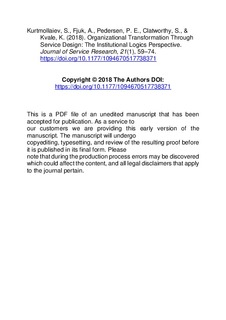Organizational Transformation Through Service Design: The Institutional Logics Perspective
Journal article, Peer reviewed
Accepted version
Permanent lenke
http://hdl.handle.net/11250/2594153Utgivelsesdato
2018Metadata
Vis full innførselSamlinger
Sammendrag
In this article, we provide in-depth insight into the process of adopting service design (SD) by a large service organization. We use an inductive interpretive approach and draw on rich longitudinal data collected in one of the world’s major telecommunication companies that undertook a series of SD initiatives to improve its innovation capability. We find that instead of merely bringing new services, SD has far-reaching consequences for organizations, prompting significant changes in the organizational mindset and routines. Building on the institutional logics perspective and acknowledging the role of individuals’ institutional work, we identify the macro-level and micro-level mechanisms of the organizational logic transformation that SD induces. Interestingly, the effects are bidirectional, as the organizational context has a considerable impact on SD as an innovation practice. As this study shows, managers and other practitioners can effectively overcome organizational hindrances to the adoption of SD by creating an SD-based corporate language, realigning key performance indicators, and facilitating learning and experimentation.
